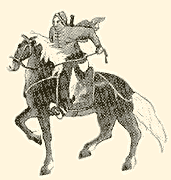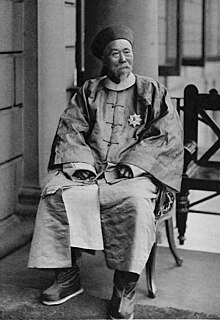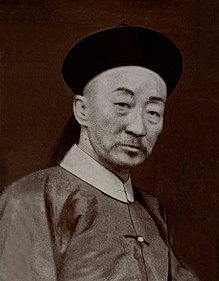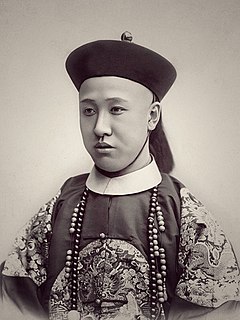 W
WZhang Decheng or Chang De-Cheng was a Chinese nationalist and leader of the Fists of Harmony and Justice during the Boxer Uprising. Though working as a boatman during his youth, he would spend much of the Boxer Rebellion as a leader of the group he created, the Fists of Harmony and Justice.
 W
WEmpress Dowager Cixi, of the Manchu Yehe Nara clan, was a Chinese empress dowager and regent who effectively controlled the Chinese government in the late Qing dynasty for 47 years, from 1861 until her death in 1908. Selected as a concubine of the Xianfeng Emperor in her adolescence, she gave birth to a son, Zaichun, in 1856. After the Xianfeng Emperor's death in 1861, the young boy became the Tongzhi Emperor, and she became the Empress Dowager. Cixi ousted a group of regents appointed by the late emperor and assumed regency, which she shared with Empress Dowager Ci'an. Cixi then consolidated control over the dynasty when she installed her nephew as the Guangxu Emperor at the death of the Tongzhi Emperor in 1875, contrary to the traditional rules of succession of the Qing dynasty that had ruled China since 1644.
 W
WCao Futian was a Chinese nationalist and leader of the Boxers during the Boxer Uprising.
 W
WThe Guangxu Emperor, personal name Zaitian, was the tenth Emperor of the Qing dynasty, and the ninth Qing emperor to rule over China proper. His reign lasted from 1875 to 1908, but in practice he ruled, without Empress Dowager Cixi's influence, only from 1889 to 1898. He initiated the Hundred Days' Reform, but was abruptly stopped when the empress dowager launched a coup in 1898, after which he became powerless and was held under house arrest until his death. His era name, "Guangxu", means "glorious succession".
 W
WLi Hongzhang, Marquess Suyi was a Chinese politician, general and diplomat of the late Qing dynasty. He quelled several major rebellions and served in important positions in the Qing imperial court, including the Viceroy of Zhili, Huguang and Liangguang.
 W
WLianyuan was a Manchu Chinese statesman in the late Qing dynasty of China. His courtesy name was Xianheng (仙蘅). Lianyuan came from the Cuigiya clan of Haixi Jurchens. He also belonged to the Bordered Red Banner under the Eight Banners system. He was best known for his role during the Boxer Rebellion and his execution afterward for his views about how to pacify the internal and external chaos caused by the rebellion.
 W
WLin Hei'er was a Chinese rebel during the Boxer Rebellion, known as the Holy Mother of the Yellow Lotus. She was a prostitute and acrobat with martial arts knowledge who became a member of the Yihetuan. During the Boxer Rebellion, she organized and commanded the Red Lantern unit of female soldiers in Tianjin.
 W
WLiu E, courtesy name Tieyun, was a Chinese writer, archaeologist and politician of the late Qing Dynasty.
 W
WMa Yukun was a Chinese army general that primarily served the Huai Army and the Resolute Army and his most notable role was during the Boxer Rebellion.
 W
WMetrophanes, Chi Sung or Mitrophan was the first Chinese Eastern Orthodox priest to be martyred. He was killed with his family members and church followers in 1900 during the Boxer Rebellion. He is the best known of some 222 Holy Chinese Martyrs glorified in August 2000 by the Eastern Orthodox Church. Metrophanes was stabbed in the chest by a crowd of rebels. Also considered martyrs are his wife Tatiana, whose Chinese name was Li, his sons, 23-year-old Isaiah and eight-year-old John, and Isaiah's nineteen-year-old fiancee Maria, who were all killed with him.
 W
WThe Red Lanterns were the women's fighting groups organized by village women who were not allowed to join the men's groups during the Boxer Uprising of 1900. Villagers said these women had supernatural powers and were called upon to perform tasks which the male Boxers could not.
 W
WRonglu, courtesy name Zhonghua, was a Manchu political and military leader of the late Qing dynasty. He was born in the Guwalgiya clan, which was under the Plain White Banner of the Manchu Eight Banners. Deeply favoured by Empress Dowager Cixi, he served in a number of important civil and military positions in the Qing government, including the Zongli Yamen, Grand Council, Grand Secretary, Viceroy of Zhili, Beiyang Trade Minister, Secretary of Defence, Nine Gates Infantry Commander, and Wuwei Corps Commander. He was also the maternal grandfather of Puyi, the last Emperor of China and the Qing dynasty.
 W
WNie Shicheng was a Chinese general who served the Imperial government during the Boxer Rebellion. Rising from obscure origins from Hefei, Anhui Province, in the early 1850s, Nie Shicheng managed to pass the county examinations for bureaucratic positions, but due to the Taiping rebellion he was forced to abandon a bureaucratic career and become a soldier.
 W
WSong Qing (1820–1902), courtesy name Zhusan, was a Chinese general who served the Imperial government during the First Sino-Japanese War and in the Boxer Rebellion.
 W
WYikuang, formally known as Prince Qing, was a Manchu noble and politician of the Qing dynasty. He served as the first Prime Minister of the Imperial Cabinet, an office created in May 1911 to replace the Grand Council.
 W
WYuan Shikai was a Chinese military and government official who rose to power during the late Qing dynasty and eventually ended the Qing dynasty rule of China in 1912, later becoming the Emperor of the Empire of China (1915–1916). He first tried to save the dynasty with a number of modernization projects including bureaucratic, fiscal, judicial, educational, and other reforms, despite playing a key part in the failure of the Hundred Days' Reform. He established the first modern army and a more efficient provincial government in North China in the last years of the Qing dynasty before forcing the abdication of the Xuantong Emperor, the last monarch of the Qing dynasty, in 1912. Through negotiation, he became the first President of the Republic of China in 1912. This army and bureaucratic control were the foundation of his autocratic rule. He was frustrated in a short-lived attempt to restore hereditary monarchy in China, with himself as the Hongxian Emperor. His death shortly after his abdication led to the fragmentation of the Chinese political system and the end of the Beiyang government as China's central authority.
 W
WZaifeng, formally known by his title Prince Chun, was a Manchu prince and regent of the late Qing dynasty. He was a son of Yixuan, the seventh son of the Daoguang Emperor, and the father of Puyi, the Last Emperor. He served as Prince-Regent from 1908 to 1911 during the reign of his son until the Qing dynasty was overthrown by the Xinhai Revolution in 1911.
 W
WZaixun, formally known as Prince Zhuang, was a Manchu prince of the Qing dynasty. He is best known for his involvement in the Boxer Rebellion.
 W
WZaiyi, better known by his title Prince Duan, was a Manchu prince and statesman of the late Qing dynasty. He is best known as one of the leaders of the Boxer Rebellion of 1899–1901.
 W
WZhang Zhidong was a Chinese official who lived during the late Qing dynasty. Along with Zeng Guofan, Li Hongzhang and Zuo Zongtang, Zhang Zhidong was one of the four most famous officials of the late Qing dynasty. Known for advocating controlled reform and modernization of Chinese troops, he served as the Governor of Shanxi Province and Viceroy of Huguang, Liangguang and Liangjiang, and also as a member of the Grand Council. He took a leading role in the abolition of the Imperial examination system in 1905. The Red Guards destroyed his tomb in 1966 during the Cultural Revolution. His remains were rediscovered in 2007 and reburied with honors.
 W
WImperial Noble Consort Keshun, of the Manchu Bordered Red Banner Tatara clan, was a consort of the Guangxu Emperor. She was five years his junior. She was known as to foreigners as the Pearl Concubine. Legend has it that she was drowned in a well on the orders of Empress Dowager Cixi.